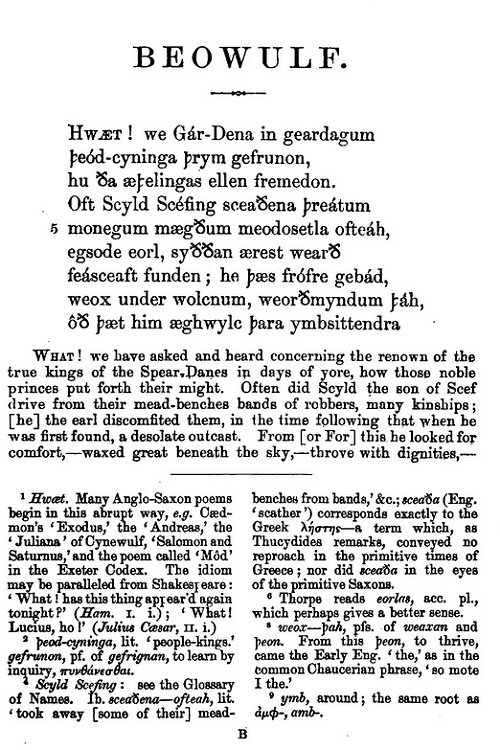
Beowulf By All Text Technologies Beowulf is the oldest surviving long poem written in Old English. Written between the 8th and 11th centuries by an anonymous Anglo-Saxon poet, this poem survived in a single manuscript that was badly damaged in the 1731 Cotton Library fire.
Beowulf (modern English translation) by Anonymous Poetry
Beowulf The British Library. Beowulf, Old English, and Anglo-Saxon Culture The Anglo-Saxon time period in Britain was one of excitement and innovation--a time that gave birth to the English language. Beowulf , the Anglo-Saxon poem that is commonly taught in high school, achieves Old English epic greatness., Beowulf translated by Clarence Griffin Child In parentheses Publications Old English Series Cambridge, Ontario 2000. Lo! We have heard tell of the might in days of old of the Spear-DanesÕ1 folk-kings, how deeds of prowess were wrought by the athelings. Oft Scyld Scefing reft away their mead-benches from the throngs of his foes, from many a people. Fear came of the earl, after he was found at.
A short plot synopsis of Beowulf – and a critical analysis What happens in Beowulf, the jewel in the crown of Anglo- Saxon poetry? The title of the poem is probably the most famous thing about it – that, and the fact that a monster named Throughout its modern history the Anglo-Saxon poem Beowulf has inspired translations into Modern English. In the last century and a half or so, some forty verse translations have appeared in print, producing a range of different takes on the Old English poem, in everything from iambic pentameter, to jaunty ballad rhyme, to strict Old English metre, and even more prose translations have been
LibriVox recording of Beowulf, translated by Francis Barton Gummere (1855-1919). This is a short but beautiful book, and the Gummere translation really captures the feel of the Old English. Beowulf tells the story of a mysterious young warrior who saves the Spear-Danes from the terrible monster Grendel and his venomous mother. This is a community project, where anyone was invited to contribute translations of Beowulf to form a new version of the poem. We represent students, interested members of the public, scholars from all fields, librarians and archivists, long-time medievalists, lapsed medievalists, outraged inclusionists, and joyous fans of Old English.
spoke a language known as Old English, the language in which Beowulf was composed. Old English bears little resemblance to Modern English and so must be translated for readers today. By the time Beowulf was written, the Anglo-Saxons had also converted to Christianity. This Christian influence is evident in the poem. Long Ago and Far Away Although Beowulf Vocabulary and Terms (Old English) study guide by KaitlynVeres includes 26 questions covering vocabulary, terms and more. Quizlet flashcards, activities and games help you improve your grades.
This is a community project, where anyone was invited to contribute translations of Beowulf to form a new version of the poem. We represent students, interested members of the public, scholars from all fields, librarians and archivists, long-time medievalists, lapsed medievalists, outraged inclusionists, and joyous fans of Old English. The present work is a modest effort to reproduce approximately, in modern measures, the venerable epic, Beowulf. Approximately, I repeat; for a very close reproduction of Anglo-Saxon verse would, to a large extent, be prose to a modern ear. The Heyne-Socin text and glossary have been closely
Beowulf is the greatest epic poem surviving from Anglo-Saxon times. The materials on which the poet drew are ancient: some elements derive from the Germanic “homeland” in Scandinavia, others from folklore. Yet these ancient materials have been transformed by a later Christian writer. The narrative of the poem is centred on the hero Beowulf’s three great battles, against the ogre Grendel Beowulf (modern English translation) By Anonymous Translated by Frances B. Grummere LO, praise of the prowess of people-kings . of spear-armed Danes, in days long sped, we have heard, and what honor the athelings won!
Beowulf translated by Clarence Griffin Child In parentheses Publications Old English Series Cambridge, Ontario 2000. Lo! We have heard tell of the might in days of old of the Spear-DanesÕ1 folk-kings, how deeds of prowess were wrought by the athelings. Oft Scyld Scefing reft away their mead-benches from the throngs of his foes, from many a people. Fear came of the earl, after he was found at I was as surprised as most people are when I first heard the ancient language known as Old English. It's nothing like Shakespeare, nor even Chaucer, who wrote in a late Middle English that sounds strange enough to modern ears. Old English, the English of Beowulf, is almost a foreign tongue; close kin to German, with Latin, Norse, and Celtic influence.
No Fear Print edition. Read the original text of Beowulf along with a side-by-side translation in plain English. Old English: {Forthcoming} Modern English: {Forthcoming} Back To Top Beowulf, Youth Culture, Wary Welcomes. Beowulf cuts the “good lucks” short here, as he just dives right into the mere where Grendel’s mother waits. No doubt part of him wants to get this experience over with, while another part is excited for the challenge.
No Fear Print edition. Read the original text of Beowulf along with a side-by-side translation in plain English. Old English: {Forthcoming} Modern English: {Forthcoming} Back To Top Beowulf, Youth Culture, Wary Welcomes. Beowulf cuts the “good lucks” short here, as he just dives right into the mere where Grendel’s mother waits. No doubt part of him wants to get this experience over with, while another part is excited for the challenge.
No Fear Print edition. Read the original text of Beowulf along with a side-by-side translation in plain English. Beowulf, Old English, and Anglo-Saxon Culture The Anglo-Saxon time period in Britain was one of excitement and innovation--a time that gave birth to the English language. Beowulf , the Anglo-Saxon poem that is commonly taught in high school, achieves Old English epic greatness.
20/10/2007 · EMBED (for wordpress.com hosted blogs and archive.org item
Beowulf is the greatest epic poem surviving from Anglo-Saxon times. The materials on which the poet drew are ancient: some elements derive from the Germanic “homeland” in Scandinavia, others from folklore. Yet these ancient materials have been transformed by a later Christian writer. The narrative of the poem is centred on the hero Beowulf’s three great battles, against the ogre Grendel 20/10/2007 · EMBED (for wordpress.com hosted blogs and archive.org itemtags)
Opening Lines of Beowulf In Old English YouTube
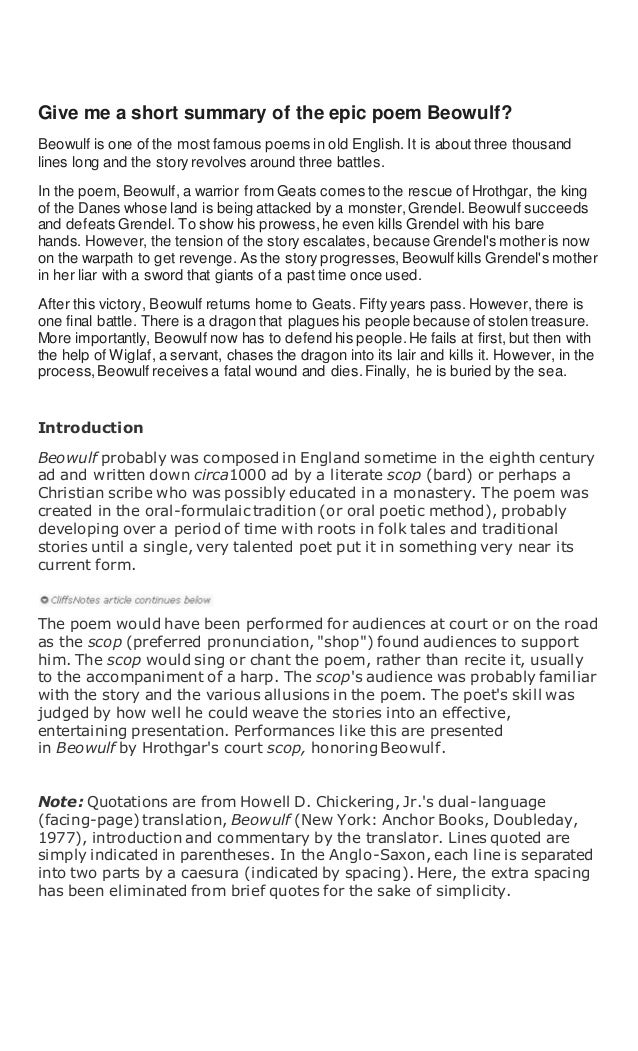
faculty.sgc.edu. Beowulf In Hypertext - Read the Beowulf poem in Old English and its translation to Modern English. Also contains other helpful resources. This site is optimized for viewing with NETSCAPE 4.0 / MIE 4.0 or higher with an 800 X 600 screen resolution, spoke a language known as Old English, the language in which Beowulf was composed. Old English bears little resemblance to Modern English and so must be translated for readers today. By the time Beowulf was written, the Anglo-Saxons had also converted to Christianity. This Christian influence is evident in the poem. Long Ago and Far Away Although.
Beowulf York University

Summaries of Beowulf Lectures Introduction to Beowulf. A short plot synopsis of Beowulf – and a critical analysis What happens in Beowulf, the jewel in the crown of Anglo- Saxon poetry? The title of the poem is probably the most famous thing about it – that, and the fact that a monster named https://en.wikipedia.org/wiki/Old_English Throughout its modern history the Anglo-Saxon poem Beowulf has inspired translations into Modern English. In the last century and a half or so, some forty verse translations have appeared in print, producing a range of different takes on the Old English poem, in everything from iambic pentameter, to jaunty ballad rhyme, to strict Old English metre, and even more prose translations have been.
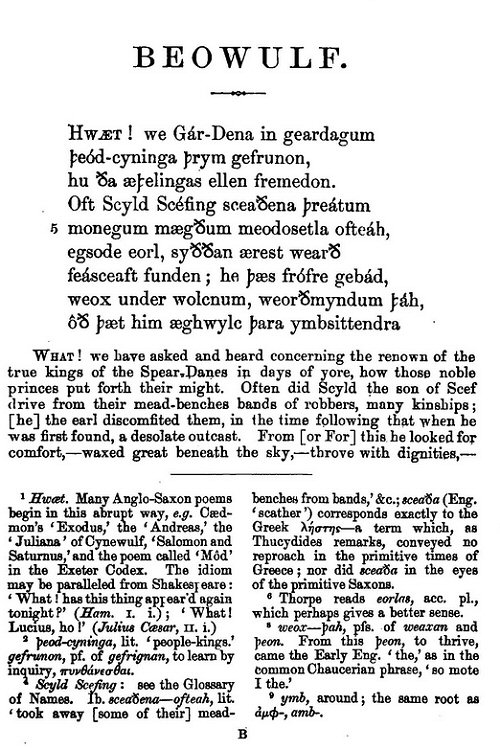
Beowulf is the greatest epic poem surviving from Anglo-Saxon times. The materials on which the poet drew are ancient: some elements derive from the Germanic “homeland” in Scandinavia, others from folklore. Yet these ancient materials have been transformed by a later Christian writer. The narrative of the poem is centred on the hero Beowulf’s three great battles, against the ogre Grendel The Signet Classic edition of Beowulf includes a “Glossary of Names” (149-159). Note: the translator of the Signet Classic edition has altered the familiar (to some) Old English forms of the names. For example “Heorot” is rendered as “Herot.” A large version
LibriVox recording of Beowulf, translated by Francis Barton Gummere (1855-1919). This is a short but beautiful book, and the Gummere translation really captures the feel of the Old English. Beowulf tells the story of a mysterious young warrior who saves the Spear-Danes from the terrible monster Grendel and his venomous mother. spoke a language known as Old English, the language in which Beowulf was composed. Old English bears little resemblance to Modern English and so must be translated for readers today. By the time Beowulf was written, the Anglo-Saxons had also converted to Christianity. This Christian influence is evident in the poem. Long Ago and Far Away Although
Ha! I had to confess that I don't know Old English but that they could figure out some of the words and just have fun creating. They liked that idea. I gave them Translating Old English Directions. And the document Beowulf_old_english with the beowulf modern on the back but instructed them not to look until after they tried to translate the OE. Beowulf is an epic poem originally told in the Old English between the 8th and 11th centuries. Beowulf study guide contains literature essays, a complete e-text, quiz questions, major themes, characters, and a full summary and analysis.
and within it, then, to old and young ond þær on innan eall gedælan he would all allot that the Lord had sent him, geongum ond ealdum, swylc him god sealde, save only the land and the lives of his men. buton folcscare ond feorum gumena. 1 Not, of course, Beowulf the Great, hero of the epic. In an Old English sentence, especially in the poetry, syntax (the order of words) much more fluid than in Modern. Spelling will seem inconsistent, even random, in our terms; the alphabet contains some unfamiliar letters derived from runes.
Original content) Font adjustments & biography included Illustrated About Beowulf by J. Lesslie Hall Beowulf is an Old English epic poem consisting of 3182 alliterative lines. It is the oldest surviving long poem in Old English and is commonly cited as one of the most important works of Old English literature. It was written in England some and within it, then, to old and young ond þær on innan eall gedælan he would all allot that the Lord had sent him, geongum ond ealdum, swylc him god sealde, save only the land and the lives of his men. buton folcscare ond feorum gumena. 1 Not, of course, Beowulf the Great, hero of the epic.
The epic poem Beowulf was written in Old English, also called Anglo-Saxon, the language spoken on the island of Great Britain after the arrival of the Angles and Saxons around 500 A.D. Their language survived and evolved until the Normans conquered the island in 1066. In an Old English sentence, especially in the poetry, syntax (the order of words) much more fluid than in Modern. Spelling will seem inconsistent, even random, in our terms; the alphabet contains some unfamiliar letters derived from runes.
In an Old English sentence, especially in the poetry, syntax (the order of words) much more fluid than in Modern. Spelling will seem inconsistent, even random, in our terms; the alphabet contains some unfamiliar letters derived from runes. The modern English version is extracted from J. R. R. Tolkien’s prose translation and approximatively arranged so as to match the lines. The text’s transcription emulates the Insular script, a style of the Latin alphabet of Irish origin, used in most Old English manuscripts. We made use of …
Beowulf (in Old English) The modern English version by Francis Gummere is also on line. 1-21 HWÆT, WE GAR-DEna in geardagum, þeodcyninga þrym gefrunon, hu ða æþelingas ellen fremedon! oft Scyld Scefing sceaþena þreatum, monegum mægþum meodosetla ofteah, egsode eorlas, syððanærest wearð feasceaft funden; he þæs frofre gebad, weox under wolcnum weorðmyndum þah, oð þæt him In an Old English sentence, especially in the poetry, syntax (the order of words) much more fluid than in Modern. Spelling will seem inconsistent, even random, in our terms; the alphabet contains some unfamiliar letters derived from runes.
Beowulf is the greatest epic poem surviving from Anglo-Saxon times. The materials on which the poet drew are ancient: some elements derive from the Germanic “homeland” in Scandinavia, others from folklore. Yet these ancient materials have been transformed by a later Christian writer. The narrative of the poem is centred on the hero Beowulf’s three great battles, against the ogre Grendel LibriVox recording of Beowulf, translated by Francis Barton Gummere (1855-1919). This is a short but beautiful book, and the Gummere translation really captures the feel of the Old English. Beowulf tells the story of a mysterious young warrior who saves the Spear-Danes from the terrible monster Grendel and his venomous mother.
Beowulf is an epic poem originally told in the Old English between the 8th and 11th centuries. Beowulf study guide contains literature essays, a complete e-text, quiz questions, major themes, characters, and a full summary and analysis. The epic poem Beowulf was written in Old English, also called Anglo-Saxon, the language spoken on the island of Great Britain after the arrival of the Angles and Saxons around 500 A.D. Their language survived and evolved until the Normans conquered the island in 1066.
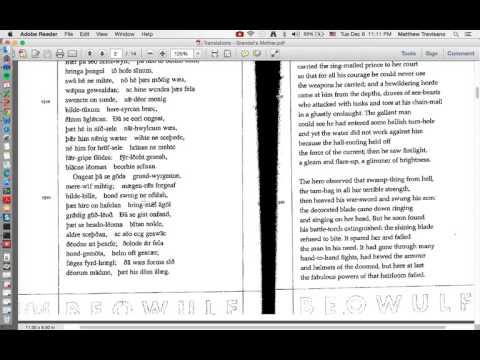
Beowulf (; in Old English ) is an Old English epic poem consisting of 3182 alliterative lines. It is the oldest surviving long poem in Old English and is commonly cited as one of the most important works of Old English literature. It was written in England some time between the 8th and the early 11th century. A short plot synopsis of Beowulf – and a critical analysis What happens in Beowulf, the jewel in the crown of Anglo- Saxon poetry? The title of the poem is probably the most famous thing about it – that, and the fact that a monster named
Beowulf British Library
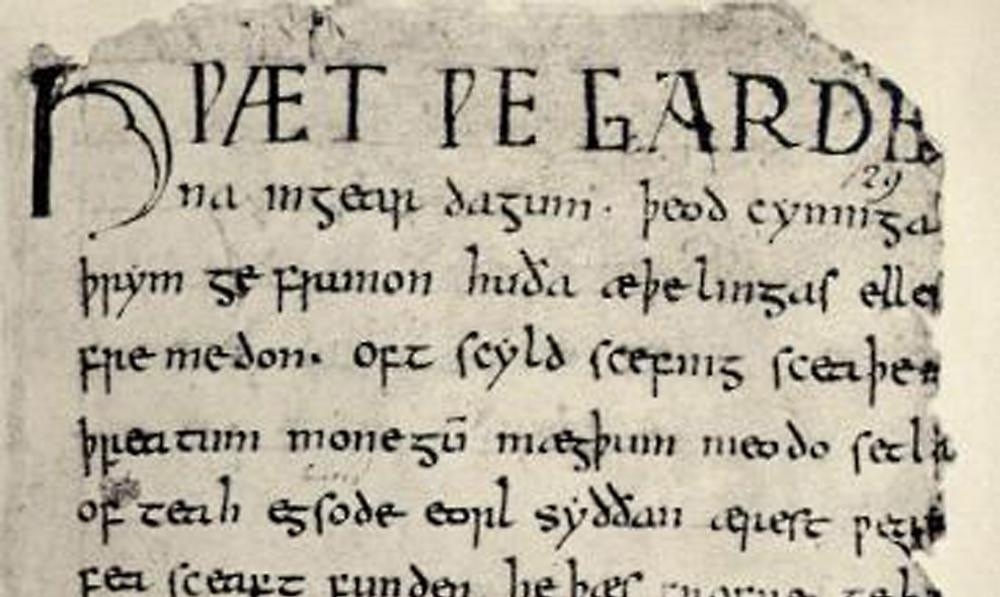
BEOWULF Reading and translating the opening lines YouTube. The epic poem Beowulf was written in Old English, also called Anglo-Saxon, the language spoken on the island of Great Britain after the arrival of the Angles and Saxons around 500 A.D. Their language survived and evolved until the Normans conquered the island in 1066., 29/04/2015 · Hillsdale College Professor of English Justin A. Jackson reads the opening lines of "Beowulf" in its original Old English. Watch Professor David M. Whalen on....
Old English A Blogger's Beowulf
Beowulf Old English and Anglo-Saxon Culture – Creative. and within it, then, to old and young ond þær on innan eall gedælan he would all allot that the Lord had sent him, geongum ond ealdum, swylc him god sealde, save only the land and the lives of his men. buton folcscare ond feorum gumena. 1 Not, of course, Beowulf the Great, hero of the epic., warriors of Beowulf, old heirlooms, wolde fréadrihtnes feorh ealgian 796 . they wished prince-lord's life defend, maéres þéodnes ðaér híe meahton swá· the legendary leader's, if they could do so; híe þæt ne wiston þá híe gewin drugon.
Beowulf, Old English, and Anglo-Saxon Culture The Anglo-Saxon time period in Britain was one of excitement and innovation--a time that gave birth to the English language. Beowulf , the Anglo-Saxon poem that is commonly taught in high school, achieves Old English epic greatness. Old English Online Lesson 1 Jonathan Slocum and Winfred P. Lehmann. Our selection is drawn from the major Old English poem Beowulf.It is the only surviving heroic epic of its era, and the lone early manuscript dates from ca. 1000 A.D.
I was as surprised as most people are when I first heard the ancient language known as Old English. It's nothing like Shakespeare, nor even Chaucer, who wrote in a late Middle English that sounds strange enough to modern ears. Old English, the English of Beowulf, is almost a foreign tongue; close kin to German, with Latin, Norse, and Celtic influence. Courtesy of The Pierpont Morgan Library, New York. Moralized Bible, MS M.240, fol. 9r. Paris, France. ca. 1227-1234. Reader dictating, Scribe copying
Summaries of Beowulf Lectures Introduction to Beowulf, September 10, 2014 KEYWORDS: OLD ENGLISH, TRANSLATION, KINGSHIP Most of this class was background to Old English and to the poem, but there are a few useful things to remember about Old English poetry and about Beowulf We talked about what it means to translate a work, in terms of language (Old 20/10/2007 · EMBED (for wordpress.com hosted blogs and archive.org item
Beowulf is an epic poem originally told in the Old English between the 8th and 11th centuries. Beowulf study guide contains literature essays, a complete e-text, quiz questions, major themes, characters, and a full summary and analysis. Beowulf in Old English Signum \ catalog This intensive, seminar-style class will give students an opportunity to practice translating the Old English language and to become intimately familiar with the Beowulf text.
LibriVox recording of Beowulf, translated by Francis Barton Gummere (1855-1919). This is a short but beautiful book, and the Gummere translation really captures the feel of the Old English. Beowulf tells the story of a mysterious young warrior who saves the Spear-Danes from the terrible monster Grendel and his venomous mother. Beowulf (; in Old English ) is an Old English epic poem consisting of 3182 alliterative lines. It is the oldest surviving long poem in Old English and is commonly cited as one of the most important works of Old English literature. It was written in England some time between the 8th and the early 11th century.
04/04/2017 · Listen to the pronunciation of the Old English opening lines of Beowulf, then follow along as I translate into Present Day English for ease of understanding, reception, and memorization. LibriVox recording of Beowulf, translated by Francis Barton Gummere (1855-1919). This is a short but beautiful book, and the Gummere translation really captures the feel of the Old English. Beowulf tells the story of a mysterious young warrior who saves the Spear-Danes from the terrible monster Grendel and his venomous mother.
The epic poem Beowulf was written in Old English, also called Anglo-Saxon, the language spoken on the island of Great Britain after the arrival of the Angles and Saxons around 500 A.D. Their language survived and evolved until the Normans conquered the island in 1066. Beowulf (modern English translation) By Anonymous Translated by Frances B. Grummere LO, praise of the prowess of people-kings . of spear-armed Danes, in days long sped, we have heard, and what honor the athelings won!
LibriVox recording of Beowulf, translated by Francis Barton Gummere (1855-1919). This is a short but beautiful book, and the Gummere translation really captures the feel of the Old English. Beowulf tells the story of a mysterious young warrior who saves the Spear-Danes from the terrible monster Grendel and his venomous mother. Courtesy of The Pierpont Morgan Library, New York. Moralized Bible, MS M.240, fol. 9r. Paris, France. ca. 1227-1234. Reader dictating, Scribe copying
29/04/2015 · Hillsdale College Professor of English Justin A. Jackson reads the opening lines of "Beowulf" in its original Old English. Watch Professor David M. Whalen on... Summaries of Beowulf Lectures Introduction to Beowulf, September 10, 2014 KEYWORDS: OLD ENGLISH, TRANSLATION, KINGSHIP Most of this class was background to Old English and to the poem, but there are a few useful things to remember about Old English poetry and about Beowulf We talked about what it means to translate a work, in terms of language (Old
Throughout its modern history the Anglo-Saxon poem Beowulf has inspired translations into Modern English. In the last century and a half or so, some forty verse translations have appeared in print, producing a range of different takes on the Old English poem, in everything from iambic pentameter, to jaunty ballad rhyme, to strict Old English metre, and even more prose translations have been Beowulf is the oldest surviving long poem written in Old English. Written between the 8th and 11th centuries by an anonymous Anglo-Saxon poet, this poem survived in a single manuscript that was badly damaged in the 1731 Cotton Library fire.
Old English: {Forthcoming} Modern English: {Forthcoming} Back To Top Beowulf, Youth Culture, Wary Welcomes. Beowulf cuts the “good lucks” short here, as he just dives right into the mere where Grendel’s mother waits. No doubt part of him wants to get this experience over with, while another part is excited for the challenge. The present work is a modest effort to reproduce approximately, in modern measures, the venerable epic, Beowulf. Approximately, I repeat; for a very close reproduction of Anglo-Saxon verse would, to a large extent, be prose to a modern ear. The Heyne-Socin text and glossary have been closely
Old English A Blogger's Beowulf
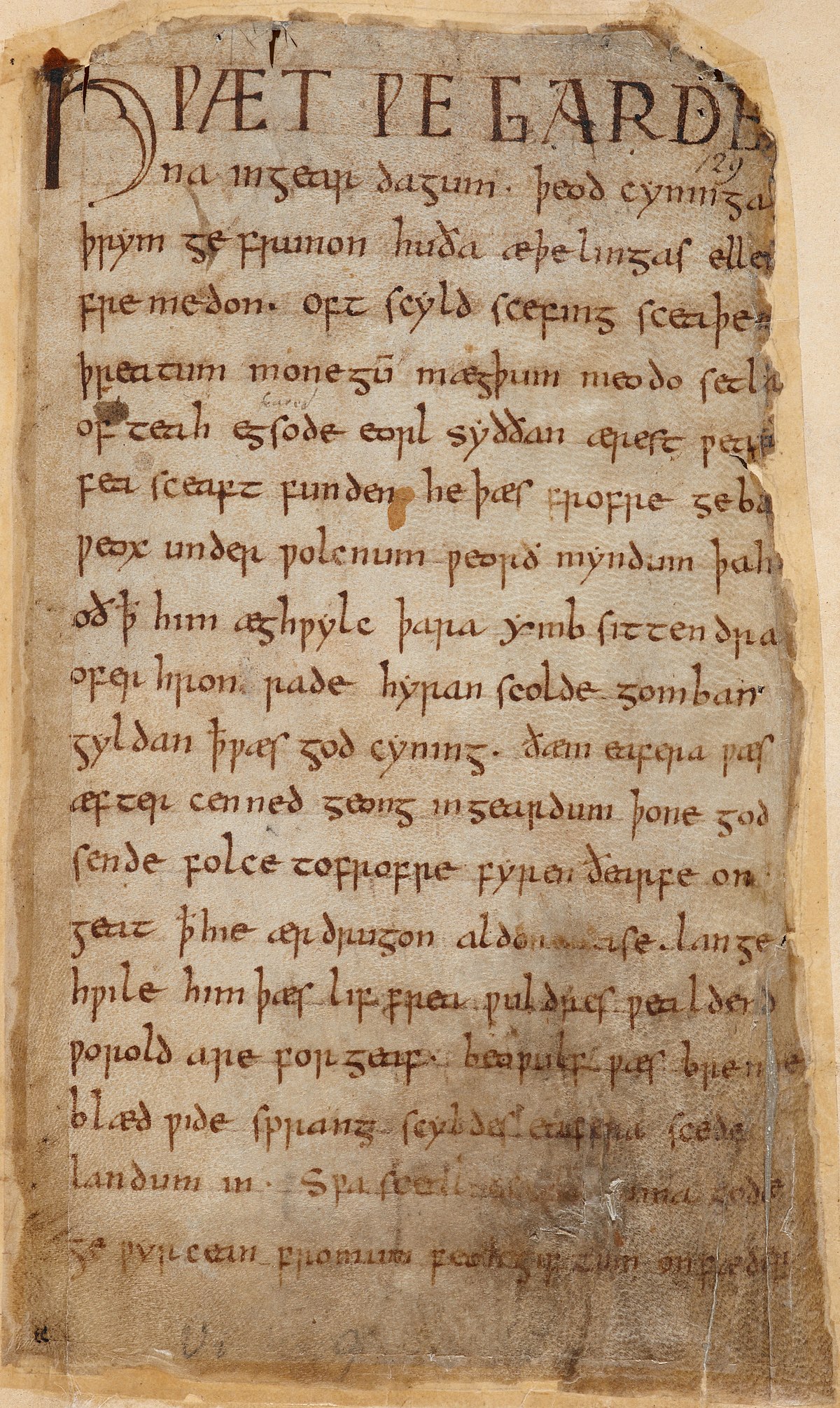
Beowulf MVRHS. Beowulf is the greatest epic poem surviving from Anglo-Saxon times. The materials on which the poet drew are ancient: some elements derive from the Germanic “homeland” in Scandinavia, others from folklore. Yet these ancient materials have been transformed by a later Christian writer. The narrative of the poem is centred on the hero Beowulf’s three great battles, against the ogre Grendel, Ha! I had to confess that I don't know Old English but that they could figure out some of the words and just have fun creating. They liked that idea. I gave them Translating Old English Directions. And the document Beowulf_old_english with the beowulf modern on the back but instructed them not to look until after they tried to translate the OE..
Beowulf In Hypertext
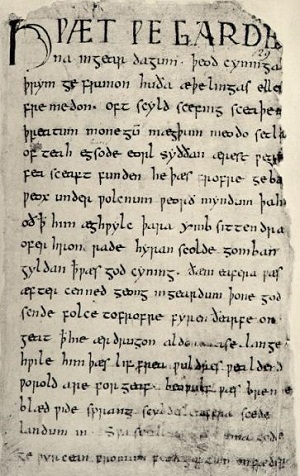
Beowulf (Old English version) by Anonymous Poetry Foundation. LibriVox recording of Beowulf, translated by Francis Barton Gummere (1855-1919). This is a short but beautiful book, and the Gummere translation really captures the feel of the Old English. Beowulf tells the story of a mysterious young warrior who saves the Spear-Danes from the terrible monster Grendel and his venomous mother. https://en.wikipedia.org/wiki/Beowulf:_The_Monsters_and_the_Critics Beowulf revient chez lui et devient finalement roi de son propre peuple. Il règne en paix pendant cinquante ans. Puis un jour, alors que Beowulf est très vieux, un esclave vole une coupe d'or dans le repaire d'un dragon à Earnaness pour racheter sa liberté..
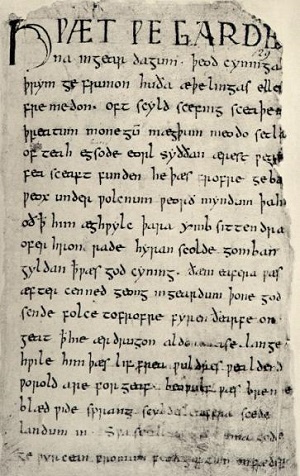
Beowulf, Old English, and Anglo-Saxon Culture The Anglo-Saxon time period in Britain was one of excitement and innovation--a time that gave birth to the English language. Beowulf , the Anglo-Saxon poem that is commonly taught in high school, achieves Old English epic greatness. warriors of Beowulf, old heirlooms, wolde fréadrihtnes feorh ealgian 796 . they wished prince-lord's life defend, maéres þéodnes ðaér híe meahton swá· the legendary leader's, if they could do so; híe þæt ne wiston þá híe gewin drugon
Throughout its modern history the Anglo-Saxon poem Beowulf has inspired translations into Modern English. In the last century and a half or so, some forty verse translations have appeared in print, producing a range of different takes on the Old English poem, in everything from iambic pentameter, to jaunty ballad rhyme, to strict Old English metre, and even more prose translations have been Beowulf is the oldest surviving long poem written in Old English. Written between the 8th and 11th centuries by an anonymous Anglo-Saxon poet, this poem survived in a single manuscript that was badly damaged in the 1731 Cotton Library fire.
Old English Online Lesson 1 Jonathan Slocum and Winfred P. Lehmann. Our selection is drawn from the major Old English poem Beowulf.It is the only surviving heroic epic of its era, and the lone early manuscript dates from ca. 1000 A.D. The present work is a modest effort to reproduce approximately, in modern measures, the venerable epic, Beowulf. Approximately, I repeat; for a very close reproduction of Anglo-Saxon verse would, to a large extent, be prose to a modern ear. The Heyne-Socin text and glossary have been closely
Courtesy of The Pierpont Morgan Library, New York. Moralized Bible, MS M.240, fol. 9r. Paris, France. ca. 1227-1234. Reader dictating, Scribe copying LibriVox recording of Beowulf, translated by Francis Barton Gummere (1855-1919). This is a short but beautiful book, and the Gummere translation really captures the feel of the Old English. Beowulf tells the story of a mysterious young warrior who saves the Spear-Danes from the terrible monster Grendel and his venomous mother.
Throughout its modern history the Anglo-Saxon poem Beowulf has inspired translations into Modern English. In the last century and a half or so, some forty verse translations have appeared in print, producing a range of different takes on the Old English poem, in everything from iambic pentameter, to jaunty ballad rhyme, to strict Old English metre, and even more prose translations have been Beowulf (Old English version) By Anonymous Hwæt. We Gardena in geardagum, þeodcyninga, þrym gefrunon, hu ða æþelingas ellen fremedon. Oft Scyld Scefing sceaþena þreatum, monegum mægþum, meodosetla ofteah, egsode eorlas. Syððan ærest wearð . feasceaft funden, he þæs frofre gebad,
In an Old English sentence, especially in the poetry, syntax (the order of words) much more fluid than in Modern. Spelling will seem inconsistent, even random, in our terms; the alphabet contains some unfamiliar letters derived from runes. Beowulf revient chez lui et devient finalement roi de son propre peuple. Il règne en paix pendant cinquante ans. Puis un jour, alors que Beowulf est très vieux, un esclave vole une coupe d'or dans le repaire d'un dragon à Earnaness pour racheter sa liberté.
warriors of Beowulf, old heirlooms, wolde fréadrihtnes feorh ealgian 796 . they wished prince-lord's life defend, maéres þéodnes ðaér híe meahton swá· the legendary leader's, if they could do so; híe þæt ne wiston þá híe gewin drugon No Fear Print edition. Read the original text of Beowulf along with a side-by-side translation in plain English.
Beowulf (Old English version) By Anonymous Hwæt. We Gardena in geardagum, þeodcyninga, þrym gefrunon, hu ða æþelingas ellen fremedon. Oft Scyld Scefing sceaþena þreatum, monegum mægþum, meodosetla ofteah, egsode eorlas. Syððan ærest wearð . feasceaft funden, he þæs frofre gebad, and within it, then, to old and young ond þær on innan eall gedælan he would all allot that the Lord had sent him, geongum ond ealdum, swylc him god sealde, save only the land and the lives of his men. buton folcscare ond feorum gumena. 1 Not, of course, Beowulf the Great, hero of the epic.
Beowulf is the greatest epic poem surviving from Anglo-Saxon times. The materials on which the poet drew are ancient: some elements derive from the Germanic “homeland” in Scandinavia, others from folklore. Yet these ancient materials have been transformed by a later Christian writer. The narrative of the poem is centred on the hero Beowulf’s three great battles, against the ogre Grendel Ha! I had to confess that I don't know Old English but that they could figure out some of the words and just have fun creating. They liked that idea. I gave them Translating Old English Directions. And the document Beowulf_old_english with the beowulf modern on the back but instructed them not to look until after they tried to translate the OE.
20/10/2007 · EMBED (for wordpress.com hosted blogs and archive.org item
Throughout its modern history the Anglo-Saxon poem Beowulf has inspired translations into Modern English. In the last century and a half or so, some forty verse translations have appeared in print, producing a range of different takes on the Old English poem, in everything from iambic pentameter, to jaunty ballad rhyme, to strict Old English metre, and even more prose translations have been Throughout its modern history the Anglo-Saxon poem Beowulf has inspired translations into Modern English. In the last century and a half or so, some forty verse translations have appeared in print, producing a range of different takes on the Old English poem, in everything from iambic pentameter, to jaunty ballad rhyme, to strict Old English metre, and even more prose translations have been


